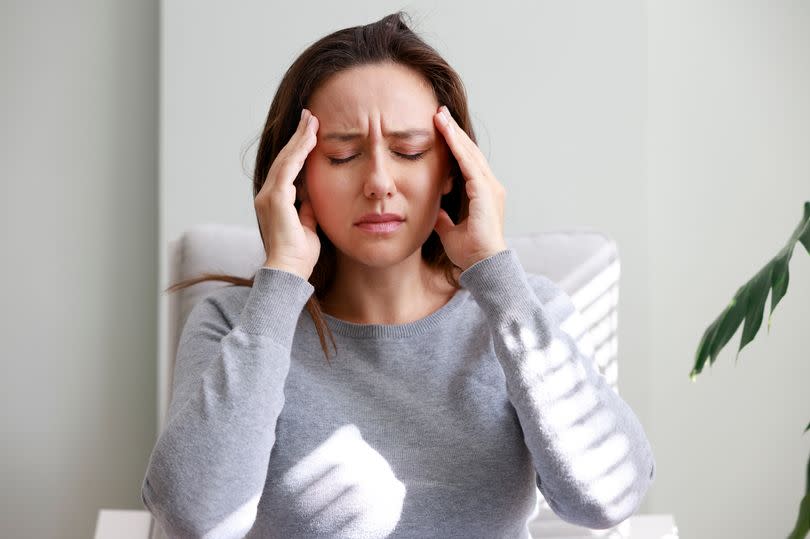NHS 'miracle' migraine pill could help millions of sufferers ease the pain

The NHS has received approval to prescribe a daily pill for people who suffer from migraines. It represents a significant breakthrough and the 'miracle' drug has the potential to aid many tens of thousands of sufferers once it becomes available.
The drug, Atogepant, sold under the brand name Aquipta, is expected to benefit around 170,000 people after NHS spending watchdog the National Institute for Health and Care Excellence (NICE) recommended it for use in England for the first time. The medication works by blocking the receptor of a protein known to cause inflammation and migraines, providing much-needed relief for those afflicted by the debilitating condition.
Migraines usually last at least a couple of hours but may last as long as three days and can in some severe cases leave people bedbound. The NHS advises to see a doctor if your migraines are severe or are get worse, if you get migraines more than once a week or if your migraines are hard to control with over-the-counter medication such as ibuprofen or paracetamol.
READ MORE Experts explain little-known dementia differences between women and men
READ MORE Dr Michael Mosley on 'best single way' to exercise, lose weight and live longer
Aquipta was recommended under new final draft guidance from the NICE. It is anticipated to publish its final guidance on the drug next month, barring any appeals.
This recommendation follows a clinical study which found the drug to be effective in up to 61 percent of patients. Currently, the only drugs that offer similar "effective" relief require an injection, making them inaccessible to some. This new development is expected to "offer more choice" to those suffering from chronic migraines, reports the Express.
Helen Knight, director of medicines evaluation at NICE, stated: "Currently, the most effective options for people with chronic migraines who have already tried three preventative treatments are drugs that need to be injected. The committee heard from patient experts that some people cannot have injectable treatments, for example because they have an allergy or phobia of needles."
Ms Knight remarked that patients with chronic migraines, defined as occurring on more than 15 days per month, "would welcome an oral treatment". She further noted that Aquipta also "offers more choice" for those experiencing episodic migraines, defined as occurring on fewer than 15 days of the month.
Aquipta is set to become available for individuals who experience at least four migraine days a month and have found no success with at least three other treatments. Currently, treatments for migraines include ibuprofen and paracetamol; drugs called triptans, designed to manage pain and cluster headaches, and medicines to help stop you feeling nauseous or being sick.
The NHS defines a migraine as "a very bad headache with a throbbing pain on one side of the head". Other symptoms may occur prior to the onset of a migraine, including feeling very tired and yawning, thirst or craving certain foods, mood swings, a stiff neck and an increased need to urinate.
Other warning signs may include sight problems such as seeing flashing lights or zigzagging lines, numbness or tingling like pins and needles, dizziness and difficulty speaking. A migraine warning sign is called an aura.
A leading migraine charity has now urged for swift access to the medication so that sufferers of this incapacitating condition can "benefit from them as quickly as possible" The Migraine Trust estimates that around 10 million adults in the UK live with migraines.
Rob Music, the charity's chief executive, said: "A migraine attack can be incredibly debilitating. Symptoms can include intense head pain, loss of or changes to the senses, and lack of ability to carry out day-to-day life."
"It is positive to see even more therapies emerging for people with migraine as many still rely on treatments developed for other conditions. We now need to ensure access is swift so that migraine patients can benefit from them as quickly as possible."
NICE advises that Aquipta should be stopped after 12 weeks if chronic migraines do not reduce by at least 30 per cent and episodic migraine by at least 50 per cent.
Health minister Andrew Stephenson commented on the development, saying: "Migraines affect millions of people in this country and this new treatment will help prevent recurring migraine attacks when other medicines have failed.
"It will allow more people whose daily life is affected by this painful, debilitating condition to manage their migraines more effectively and to live their lives to the fullest."

 Yahoo News
Yahoo News 
